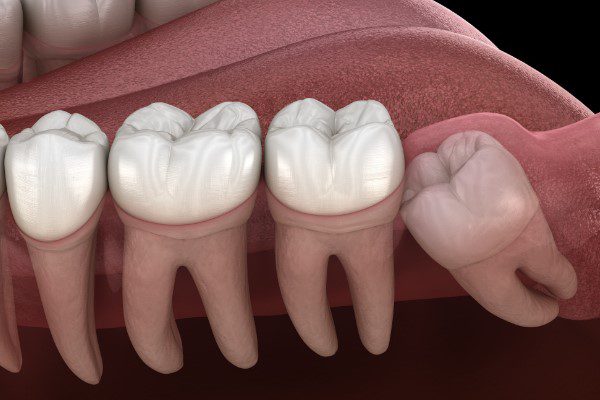Health
What Causes Wisdom Teeth Crowding in Children?

When your child’s wisdom teeth start to come in, you may not have to pay much attention to them. When they pop through, the gums are swollen for a day or two, and you will see your child grimace and clench their jaw now and then.
Do you want to know what causes wisdom teeth crowding in children? When this happens, it means that the wisdom teeth are taking up space. They will no longer have room to come out of the gum, and their mouth will be too small.
Keep on reading, and we’ll help you understand what causes crowded wisdom teeth.
Genetic Predisposition
Genetic predisposition is a key cause of crowded teeth in the mouth when it comes to wisdom teeth growth in children. It is believed that the shape of our skulls and the size of our jaws are the result of our genetics. Individuals with smaller jaws have less space for growth, resulting in teeth crowding or misalignment.
Wisdom teeth, in particular, have difficulty in erupting, as there is often not enough room in the mouth to accommodate them. Genetics plays a role in how these growths occur, as biology influences the size and shape of our jaws. As such, if an individual has a predisposition to having fewer teeth and a smaller jaw, overcrowding is more likely to occur.
Delayed Eruption
Delayed eruption is a common cause of wisdom teeth crowding in children. This occurs when the wisdom teeth don’t have enough room in the jaw to come through. The surrounding teeth are forced out of space, resulting in overcrowding and misalignment.
In some cases, they can even be completely covered by the gums and bone. Common signs of delayed eruption include jaw pain, swelling, and infection. If left untreated, the impacted wisdom teeth can cause further complications such as oral decay, infections, and even cysts.
Early detection of delayed wisdom teeth eruption can help avoid issues in your dental health. It is important to consult a dentist if you suspect that your child’s wisdom teeth are impacted to discuss possible treatment.
Crooked Existing Teeth
Crooked existing teeth can lead to crowding of wisdom teeth in children. As the adult teeth erupt and push the baby teeth forward, it can prevent the wisdom teeth from erupting. This can cause pain and discomfort for children.
Tooth movement caused by crooked teeth can also affect the positioning of the wisdom teeth. Crowding of wisdom teeth can also put pressure on the surrounding teeth, causing pain and infection and even misaligning the teeth.
Early orthodontic treatments to fix overcrowded teeth with braces or retainers can help children keep their teeth in line and make sure the wisdom teeth have enough space to grow in properly. Parents should take young children to the orthodontist to catch any potential problems early on. Early detection and treatment can lead to fewer problems.
Poor Oral Hygiene
Poor oral hygiene can lead to dental plaque and tartar buildup, resulting in tooth decay and gum disease. Tooth decay can lead to the misalignment of the teeth or abnormal growth of the jawbone, which can push the wisdom teeth out of alignment. This pressure can cause them to crowd together or even become impacted and get stuck in the gums.
Additionally, it can lead to gum inflammation, which can prevent the wisdom teeth from erupting and cause them to become crowded. Parents should ensure that their children have good dental care habits to prevent this problem. This includes brushing regularly, flossing, and visiting the dentist regularly.
Early Loss of Baby Teeth
When baby teeth are lost too soon, the other teeth in the mouth can shift and cause overcrowding. If a child has early baby tooth loss before age 8-9, the eruption space of the wisdom teeth can become restricted. This can lead to the wisdom teeth erupting at an angle and pushing against the other teeth in the mouth.
Wisdom teeth crowding can also occur due to the lack of space because other permanent teeth have already filled the space. It is important to check a child as early detection is necessary to prevent wisdom teeth crowding and the problems associated with it.
Abnormal Tooth Size
It is important to check the size of teeth as children are rapidly growing and their jaws are changing shape. If the size of the teeth is too large, this causes space constriction and can lead to the wisdom teeth having nowhere else to erupt.
In some cases, there isn’t enough room in the jaw for the teeth to fit. If this is the case, the wisdom teeth must be removed to protect the other teeth.
Your dentist will be able to accurately assess the size of your child’s teeth and assess any overcrowding that could be present. If abnormal tooth size is causing wisdom teeth estimates in your child, it is important to take action to avoid pain and discomfort.
Overuse of Pacifiers and Thumb-Sucking
Overuse of pacifiers and thumb sucking is a common cause of wisdom teeth crowding in children as they grow. This is because prolonged sucking can cause the front four teeth to move forward. This gives the four wisdom teeth, which normally develop in the back of the mouth, less room to fit into the jawbone.
The tips of the wisdom teeth may rub against the cheeks, causing discomfort and infection. In some cases, the wisdom teeth will be unable to fit in the available space, leaving them sticking out of the gum line, leading to overcrowding. This crowding needs corrective surgery and may cause the individual to experience pain and dental issues later in life.
Learn More About Wisdom Teeth Crowding
In conclusion, wisdom teeth crowding in children is usually caused by a variety of factors, from tooth size and jaw placement to gum disease. If you’re concerned, make an appointment with an orthodontist to explore the cause and discuss available treatment options. With the right care, you can ensure your child enjoys a healthy, beautiful smile for years to come.
If you find this helpful, check out our other articles to learn more about oral health.
Health
Understanding FTMÇ: A Comprehensive Guide

Hormonal therapy is essential for bringing a person’s physical attributes into line with their gender identification when it comes to gender transition. Female-to-Male Çonversion, or FTMÇ for short, is a particular kind of hormone therapy that transgender males seek out as a part of their journey toward transformation. The goal of this essay is to give readers a complete grasp of FTM·, its ramifications, and its importance within the larger framework of gender transition.
Introduction to FTMÇ
Female-to-Male Çonversion, or FTMÇ, is a kind of hormone therapy designed specifically for transgender males. Hormone therapy is used to cause bodily changes in order to align a person’s secondary sexual traits with their gender identity.
Hormonal therapy is an essential part of gender transition for many transgender people. It facilitates changes that lead to a more true alignment with their recognized gender, such as the deepening of their voice, growth of facial hair, and redistribution of body fat.
FTMÇ’s Hormonal Constituents
A. Administration of Testosterone
The main male sex hormone, testosterone, is administered and is important to FTMÇ. Numerous physical changes are brought on by testosterone, such as the growth of body and facial hair, a deeper voice, and an increase in muscular mass.
B. Tracking Your Hormone Levels
Hormone levels must be regularly monitored during the FTM· process. This minimizes any health concerns and maximizes the desired bodily changes by guaranteeing that the hormones are supplied within safe and effective ranges.
FTMÇ-Related Physical Alterations
A. Deepening of Voice
The deepening of voice is one obvious result of testosterone therapy. This contributes to a more masculine voice range, although it happens gradually and may take several months to become noticeable.
B. Body and Facial Hair Growth
Transgender males can have more masculine hair patterns because testosterone promotes the growth of facial and body hair. Each experiences this growth to a different degree.
C. Changes in the Distribution of Body Fat
A more manly body shape is the outcome of hormonal therapy’s influence on the redistribution of body fat. This results in a more manly physique by lowering subcutaneous fat in specific places.
A Look at Emotional and Mental Wellbeing
A. Shifts in Emotion
Emotional experiences can be influenced by hormone therapy. When their hormone levels fluctuate, some people may experience changes in their mood and emotional responses. It is essential to be conscious of these changes and to ask for help when required.
B. Assistance with Mental Health
The psychological implications of changing one’s gender are important. with order to assist people with negotiating the emotional and mental health components of their transformative journey, FTMÇ frequently entails counseling or therapy.
Possible Health Risks and Things to Think About
A. Hormonal Therapy Side Effects
Under the guidance of medical professionals, FTMÇ is generally safe, however it is not without some adverse effects. These could include changes in cholesterol levels, acne, and possible effects on fertility.
B. Frequent Medical Exams
Regular health check-ups are recommended for individuals undergoing FTMÇ in order to identify any possible side effects or health concerns. This proactive approach guarantees that any issues are identified and fixed right away.
Legal and Social Aspects
A. Consequences for the Law
Legal ramifications for gender transition, especially FTMÇ, could include changing identifying documents to fit the person’s gender identity. Comprehending and maneuvering through these legal procedures is essential for an easy transition.
B. Acceptance and Support from Society
For those undergoing FTMÇ, the assistance of friends, family, and the larger community is essential. Transgender men’s well-being is greatly enhanced by the establishment of a welcoming social environment.
Conclusion
Transgender males are empowered to pursue authentic self-expression through FTMÇ, a transforming instrument. It is essential to comprehend the psychological, social, and physical facets of FTMÇ in order to provide a welcoming and inclusive atmosphere for those going through this process. It is crucial to accept the variety of gender identities and the varied paths taken by transgender people as society changes. FTMÇ is a big step toward understanding and inclusivity in the field of gender transition.
Health
WELLHEALTH HOW TO BUILD MUSCLE TAG: A HEALTH GUIDE

Introduction
Many individuals are curious about the finest methods for improving their health and wellhealth how to build muscle tag and power. Whether you’re an athlete wanting to improve your performance or simply looking to improve your health, muscle offers many benefits. This article covers everything from goal-setting to staying motivated while building muscle.
ADVANTAGES OF WELLHEALTH HOW TO BUILD MUSCLE TAG
The growth of muscles has several advantages.
- Increased Metabolism
- There has been an improvement in power and endurance.
- improved proportion of body fat
- Preventing injuries and enhancing posture
- increased self-confidence in one’s skills
Comprehending Muscle Growth
It’s crucial to understand how muscles grow before starting a muscle-building regimen. When your muscles are under stress from resistance exercise, you experience muscular development, also known as hypertrophy. Because of the repair and development that occur after the tiny injury they receive during exercise, muscles become bigger and stronger.
Clearly defining objectives
Establishing clear, achievable objectives is crucial to a successful muscle-building endeavor. Decide whether your objectives are to gain strength, bulk up, or both. You will remain motivated, and on course if you have a goal in mind.
Formulating An Organized Exercise Program
Exercise must be done methodically to grow muscle. It is recommended to integrate various bodyweight and weightlifting workouts with other strength training approaches. Exercises that isolate certain muscular groups should be mixed with complex movements like squats, deadlifts, and other exercises.
The significance of diet
Dietary practices have a big impact on muscle building. Consume a diet rich in lipids, carbohydrates, and protein in a balanced manner. Because it provides the amino acids required for muscle development and repair, protein is essential.
Recuperation And Rest
Muscle development and healing need time. Overtraining raises the risk of injury and lowers performance. In between exercises, leave your muscles at least 48 hours to relax and recuperate. Get lots of rest. Muscular increases occur throughout this period of rest and recovery.
Supplementation for the Development of Muscle
When attempting to gain muscle, eating healthfully should always come first, but supplements may also be helpful. Add branched-chain amino acids, creatine, and protein powder to your list of possible supplements. You should always with your doctor before incorporating supplements into your regular regimen.
Maintaining consistency is essential
More than anything else, consistency is key to building muscle. It’s crucial to persevere even if you lack motivation to work out or eat healthily. Your efforts and work will eventually pay off.
Breaking Through Plateaus
There’s a chance that progress may eventually stop. To go above this barrier, change up your routine, intensify your workouts, or try some new exercises. Because growth is a process, it is natural to reach plateaus along the route.
COMMON MISTAKES AYURAGEABLE
Avoid the common errors of overtraining, malnutrition, and incorrect form. Making these types of errors could slow you down and drive you mad. See an expert if you need assistance getting in shape.
Maintaining Motivation
Maintaining your positive attitude is essential when trying to build muscle. By exercising with a partner, establishing minor objectives to celebrate along the way, and monitoring your progress, you may improve your odds of success.
Monitoring Advancement
It’s critical to monitor your progress to stay motivated and make any adjustments to your approach. Regularly write down and take pictures of your exercises so you can monitor your gains in strength and muscle growth.
Safety Measures
Consider everyone’s welfare at all times. By exercising properly and paying attention to your body, you may prevent injury. If your discomfort is more than just the normal soreness that comes with using your muscles, get help.
FINAL VERDICT
Achieving wellhealth how to build muscle tag gain is a great and achievable aim that benefits you both psychologically and physically. If you follow through on your exercises, food, and relaxation times, you may enhance both your beauty and health. Given that progress takes time, have patience and be committed to your aim.
FAQ:
WHAT IS THE TIMELINE FOR NOTICEABLE MUSCLE GAINS?
While results may vary from person to person, 8–12 weeks of consistent exercise should result in noticeable muscular growth.
IS IT POSSIBLE TO GROW MUSCLE WITHOUT VISITING THE GYM?
Resistance bands, bodyweight exercises, and other everyday objects may help you gain muscle at home. You have more freedom at a fitness facility with more gadgets, however.
CAN I BUILD MUSCLE BY LIFTING HEAVY WEIGHTS?
Not only may lifting larger weights promote muscle development, but so can using lighter weights and increasing the number of repetitions.
IS CALORY COUNTING NECESSARY FOR MUSCLE BUILDING?
For the most part, muscle builders just need to worry about eating a good, balanced diet and receiving adequate protein; calorie tracking may not be necessary.
A PLATEAU IN MY MUSCLE-BUILDING PROGRESS: WHAT SHOULD I DO?
Try varying things up, exerting more effort, and completing more diverse workouts if you’ve reached a fitness plateau. See a trainer if you’d want help on how to lose weight.
Health
Tips for Making the Most of Your Time as a Traveling Physical Therapist

As a traveling physical therapist, mastering the art of mobility can prove to be both challenging and rewarding. The privilege of exploring new locales and working with diverse patient populations comes with a unique set of considerations, from adapting to different work environments to managing time effectively. With the right approach, however, you can transform challenges into opportunities for growth and professional enrichment. In this article, we’ll explore the quintessential tips to maximize your experience as you navigate the exciting journey of a traveling physical therapist. Keep reading to discover how to optimize your time on the road.
Maximizing Opportunities for Professional Development on the Road

As a professional constantly on the move, you have a unique opportunity to engage in continuous learning and development. Each new location brings with it a new set of challenges and learning experiences that can substantially contribute to your professional expertise. Proactively seeking out these opportunities can significantly advance your career trajectory.
Making the most of educational opportunities is key, whether it’s attending workshops, conferences or pursuing additional certifications. Moreover, working in various settings exposes you to different approaches and techniques in physical therapy, allowing you to broaden your skill set and apply new knowledge in practice.
Additionally, traveling can serve as an impetus for networking with fellow therapists and healthcare professionals. Exchanging insights and building professional relationships are integral parts of your development and can lead to mentorships or collaborative projects that can boost your career. Never underestimate the potential of a conversation with a new colleague while on assignment.
Professional growth can also stem from the challenges you face. Each problem encountered and solved not only adds to your experience but reinforces your reputation as a competent and versatile therapist. Within the physical therapy community, this caliber of resilience and expertise is highly valued and may lead to physical therapy travel jobs that offer even more diverse experiences and opportunities.
Leveraging Technology To Streamline Administrative Tasks While Traveling
Leveraging technology efficiently is a game-changer for the traveling physical therapist. With administrative duties following you wherever you go, digital tools can minimize the hassle and time spent on paperwork. Numerous software programs and apps are specifically designed to manage patient records, schedule appointments, and even process billing.
Utilizing these digital resources allows you to spend more time focusing on patient care rather than being bogged down by administrative tasks. Cloud-based storage solutions, for example, can grant you access to necessary documentation whenever and wherever you need it. This reduces the potential for delays in care and ensures you maintain the high-quality service your patients expect.
Finally, integrating technology into your work offers a taste of the comforts of home, even when you’re on assignment. Applications for meal planning, finding temporary housing, such as a nearby carpet store for your living space, or maintaining fitness routines can help maintain normalcy and personal satisfaction as you adapt to each new setting, making each place feel a bit more like home.
Effective Time Management Strategies for Traveling Physical Therapists

Effective time management is a cornerstone of a successful career as a traveling physical therapist. It’s not just about managing your professional responsibilities; it’s also about carving out time for your own well-being and personal interests while on the road. Start by establishing a daily routine that allocates time for patient care, documentation, travel, and leisure activities.
Incorporating time-saving techniques can be beneficial as well. Prioritizing tasks, setting up reminders, and using downtime wisely can help maximize productivity. Be mindful of how you schedule patients, aiming for a flow that minimizes idle time and travel disruptions between appointments or facilities.
Balancing work with personal life can be more complex when away from home, but it’s not insurmountable. Allocating specific time slots to check in with family, explore your new surroundings, or simply relax is essential to prevent burnout. Remember, managing your time well ensures that you’re not just surviving each assignment, but truly thriving.
In the digital age, a plethora of tools and apps are available to keep your schedule organized. Leveraging these technological aids can streamline the process of tracking appointments, setting up reminders, and maintaining contact with your home base, all of which contribute to a well-managed work-life balance.
Overall, the experiences you’ll gain as a traveling physical therapist are unparalleled in their ability to expand both your professional capabilities and life perspective. Altogether, these elements constitute a comprehensive approach to a vibrant and successful career on the move.
-
Technology2 years ago
IGANONY – The Instagram Story Viewer That Will Change Your Life
-
Health3 years ago
Velovita Snaps: The Weight Lose Solution You’ve Been Waiting For
-
News & Law2 years ago
Trusted Legal Help: 8 Things to Look for When Hiring a Lawyer
-
Entertainment3 years ago
Solazola: Biography, Early life, Boyfriend and Nethwoth
-
Technology2 years ago
Clevo Nh70: A Powerful Gaming Laptop For Modern Era
-
Entertainment3 years ago
Bubblebratz: A Quick Biography












